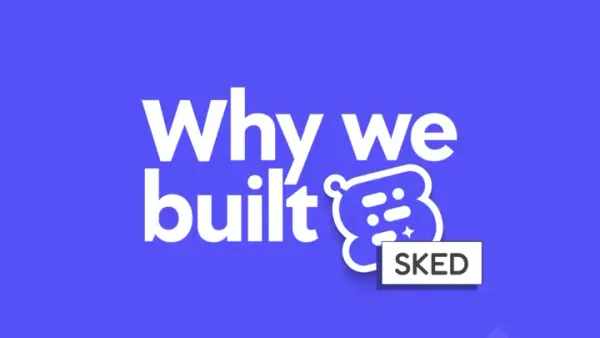It started with a small, familiar frustration.
We were sitting in Slack — like we do most days — jumping between threads, replying to teammates, trying to move work forward. And somewhere in all that motion, we noticed something.
Getting work done almost always meant scheduling a meeting. And scheduling that meeting — even something quick — felt harder than it should.
If you’re managing a product, a project, or a team, you know this well. You’re constantly syncing across design, engineering, sales, and leadership. And every sync needs a slot on the calendar.
Someone messages you: “Let’s catch up tomorrow?”
You say: “Sure.”
And then the dance begins.
You leave Slack. Open Google Calendar.
Click to create an event.
Find the right text box, type their name, and view schedules.
Stare at a wall of overlapping meetings.
Pick a slot that doesn’t feel awful.
Adjust the timing, change the title, maybe add a Meet or Zoom link.
Click send.
Then you go back to Slack. Let them know. And wait. Sometimes they reply right away, sometimes hours later. “Actually — can we move it?”
You sigh. And start again.
When this happens five times a day
At first, it felt like a small problem. Micro, even.
But it wasn’t. It was everywhere. On bad days, it happened five to ten times. On regular days, maybe two to five. And every single time, it pulled us away from the work we were trying to do.
We’d lose our place. Lose the thread. Forget why we opened Slack in the first place.
It wasn’t just about saving time — though that mattered. It was about protecting attention. Because the cost of switching tabs, mentally and literally, adds up fast.
We believe real work happens in flow — that rare state where things feel clear and focused. And every time we jumped between apps just to schedule something, we felt that flow break.
A small pain, shared by many
What caught our attention — and held it — was how many people around us had felt the same thing. This wasn’t just a “me” problem. It was a “we all do this 10 times a day and kind of hate it” problem.
Across Slack. Across Teams. Across email. Even folks using WhatsApp or Telegram for work. The tools looked different — but the pain rhymed.
Tiny frictions, shared by millions. Kind of like the flu. That’s the stuff we like to build for.
So we asked a simple question
What if we didn’t need to switch tabs at all?
What if we could just type — “Get 30 minutes with Alex tomorrow” — and it would just happen?
What if we could move a meeting, cancel one, or check someone’s calendar — all without leaving Slack?
Not through dropdowns or bot interfaces. Just plain English. One line. One command. One less thing on your mind.
That was the seed of Sked, an AI scheduling assistant.
Slack is where we live — but is it where we work in flow?
We love Slack. It’s where we work, talk, share, joke, and build. It’s open all day. It’s the screen we return to, over and over.
But Slack also distracts. It scatters. It pulls. It was built to speed up work — but it was never built to help your mind rest.
That’s the contradiction we started to notice. The place we spend our days — the tab that never closes — also chips away at our focus.
So we began wondering: Can flow exist inside Slack?
We don’t think flow is impossible. We think it’s overdue.
Because AI is here now — and it can help. It can remember, sort, schedule, prioritise. It can hold the mental to-do list, so we don’t have to. It can take the small, manual things — like booking or rescheduling a meeting — and just get them done.
So we asked: What if we built tools that make Slack feel lighter? Tools that reduce cognitive load — instead of adding to it?
We started with scheduling. Because yes, it’s small — but it’s everywhere.
And it’s the tip of a much bigger problem: attention.
What Sked does — and what it doesn’t
Sked doesn’t try to do everything. It doesn’t want to be your life OS. It just helps you book and move meetings inside Slack — without losing focus.
It’s not perfect. But we’ve built it with care. And with the hope that it gives you just a bit more space to think. If it saves you a little flow, or one tab switch, that’s a win.
If it doesn’t — tell us what’s broken. We’ll fix it.
Post script
Thanks for reading.
And if you’ve ever groaned mid-Slack-thread when someone said “let’s find time” — we hope you’ll give Sked a try.
